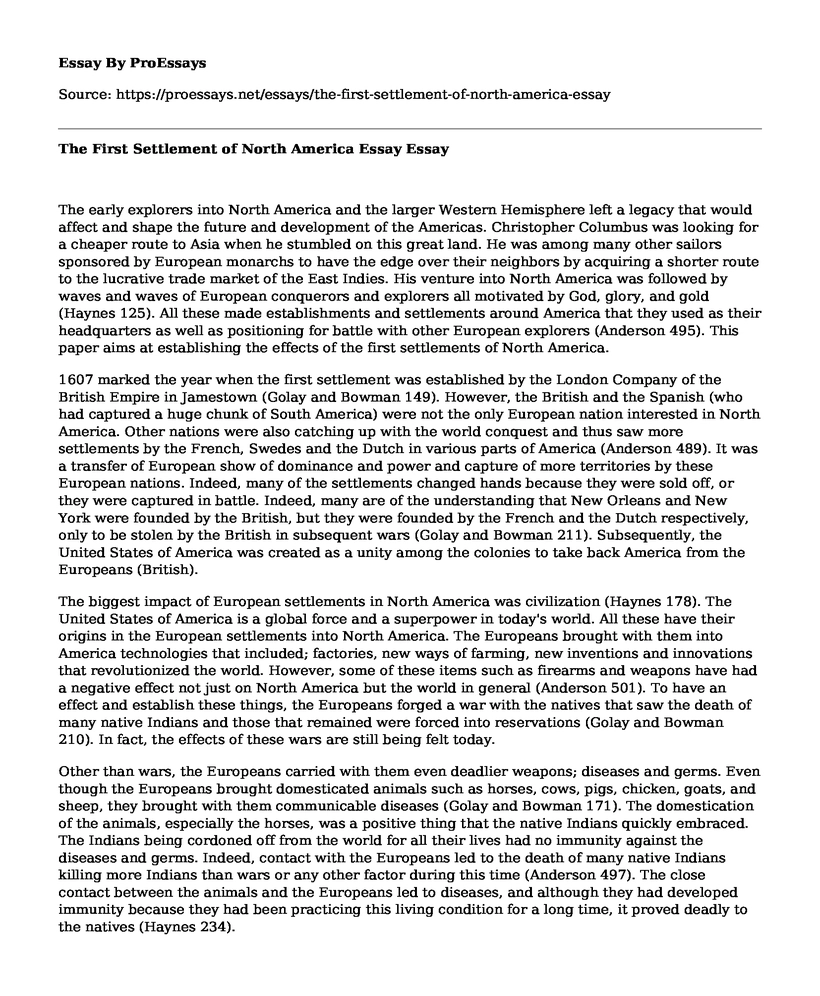The early explorers into North America and the larger Western Hemisphere left a legacy that would affect and shape the future and development of the Americas. Christopher Columbus was looking for a cheaper route to Asia when he stumbled on this great land. He was among many other sailors sponsored by European monarchs to have the edge over their neighbors by acquiring a shorter route to the lucrative trade market of the East Indies. His venture into North America was followed by waves and waves of European conquerors and explorers all motivated by God, glory, and gold (Haynes 125). All these made establishments and settlements around America that they used as their headquarters as well as positioning for battle with other European explorers (Anderson 495). This paper aims at establishing the effects of the first settlements of North America.
1607 marked the year when the first settlement was established by the London Company of the British Empire in Jamestown (Golay and Bowman 149). However, the British and the Spanish (who had captured a huge chunk of South America) were not the only European nation interested in North America. Other nations were also catching up with the world conquest and thus saw more settlements by the French, Swedes and the Dutch in various parts of America (Anderson 489). It was a transfer of European show of dominance and power and capture of more territories by these European nations. Indeed, many of the settlements changed hands because they were sold off, or they were captured in battle. Indeed, many are of the understanding that New Orleans and New York were founded by the British, but they were founded by the French and the Dutch respectively, only to be stolen by the British in subsequent wars (Golay and Bowman 211). Subsequently, the United States of America was created as a unity among the colonies to take back America from the Europeans (British).
The biggest impact of European settlements in North America was civilization (Haynes 178). The United States of America is a global force and a superpower in today's world. All these have their origins in the European settlements into North America. The Europeans brought with them into America technologies that included; factories, new ways of farming, new inventions and innovations that revolutionized the world. However, some of these items such as firearms and weapons have had a negative effect not just on North America but the world in general (Anderson 501). To have an effect and establish these things, the Europeans forged a war with the natives that saw the death of many native Indians and those that remained were forced into reservations (Golay and Bowman 210). In fact, the effects of these wars are still being felt today.
Other than wars, the Europeans carried with them even deadlier weapons; diseases and germs. Even though the Europeans brought domesticated animals such as horses, cows, pigs, chicken, goats, and sheep, they brought with them communicable diseases (Golay and Bowman 171). The domestication of the animals, especially the horses, was a positive thing that the native Indians quickly embraced. The Indians being cordoned off from the world for all their lives had no immunity against the diseases and germs. Indeed, contact with the Europeans led to the death of many native Indians killing more Indians than wars or any other factor during this time (Anderson 497). The close contact between the animals and the Europeans led to diseases, and although they had developed immunity because they had been practicing this living condition for a long time, it proved deadly to the natives (Haynes 234).
Finally, the invasion of North America and subsequent settlement led to a world that had nearly all races settled in it. Although some races achieved their recognition from regretful ideals such as slavery and regression, the coming together of the Europeans led to a nation with mix cultures (Anderson 479). As such, the settlements have led to America being recognized as the most cosmopolitan nation in the world with diverse cultures (Haynes 326). There are those who view this as a disadvantage because these cultures are extremely dysfunctional. On the other hand, the settlements have nearly vanquished the original owners of the land. It is obvious that all who claim to own America have their ancestry outside whereas the true owners of the land suffer in inhospitable reservations (Anderson 482).
Conclusion
In conclusion, the European invasion of North America and settlement changed the world both for the settlers and the natives. However, the changes are both positive and negative, and whereas some effects are negative to some, they are positive to the others. For instance, the new technologies were important in the industrial, agricultural and scientific development but on the other hand, it led to people losing their lands and their lives (Haynes 251). Altogether, the invasion of North America led to America as we know it today.
Works Cited
Anderson, Chad. "Rediscovering Native North America: Settlements, Maps, and Empires in the Eastern Woodlands." Early American Studies: An Interdisciplinary Journal, vol. 14, no. 3, 2016, pp. 478-505.
Golay, Michael, and John S. Bowman. North American Exploration. J. Wiley, 2003.
Haynes, Gary. The Early Settlement of North America: The Clovis Era. Cambridge UP, 2002.
Cite this page
The First Settlement of North America Essay. (2022, Jul 05). Retrieved from https://proessays.net/essays/the-first-settlement-of-north-america-essay
If you are the original author of this essay and no longer wish to have it published on the ProEssays website, please click below to request its removal:
- American History Book Curriculum
- The Pearl Harbor Attack - Paper Example
- Motivation for European Imperialism in Africa Essay
- Essay Sample on the Horrific Consequences of War: U.S. in WWII & Vietnam
- Essay Example on 13th Amend: Slavery to Mass Incarceration of Blacks
- Essay Sample on Leadership and Political Influence: The Multiparty State of Canada
- Free Essay Sample: American and Iranian Views on Resource Scarcity and Conservation







